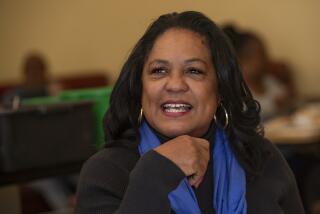Editorial: Tom LaBonge is gone—and so (unfortunately) are his documents
When newly sworn-in Los Angeles City Councilman David Ryu showed up for work at City Hall last July, he was shocked to find an office stripped bare except for a few computers. There were no files for ongoing projects in the district, which had been represented for 14 years by Tom LaBonge. There were no logs of constituent service requests. No records showing how hundreds of thousands of dollars of Council District 4 funds had been spent. In fact, Ryu’s staff said, not a scrap of paper was left for the new councilman.
Yes, politics can be ugly. During the runoff with LaBonge’s former chief of staff, Carolyn Ramsay, Ryu was highly critical of how the councilman had managed his office. Ryu complained LaBonge had used “secret slush funds” to bankroll pet projects and to pad staff salaries, and he pledged to make discretionary spending more transparent. LaBonge, who backed Ramsay, might have destroyed the documents just to make Ryu’s life more difficult; he certainly wouldn’t be the first outgoing politician to have let sore feelings override his professionalism. Or perhaps, as some allege, there were documents he didn’t want seen.
Some council members have felt free to toss out any documents they choose, which denies people the right to view public records.
That’s why government bodies should have much clearer rules and policies on what records should be kept in the transition between the outgoing and incoming elected official.
The status quo is not only terribly inefficient, it’s also possibly illegal. California law requires that public records be preserved for a certain period of time. A city can destroy records if lawmakers and the city attorney approve, but not if the records are unduplicated and less than two years old. The city’s own rules spell out how long city departments are supposed to retain documents, but they haven’t been applied in the past to council offices. So some council members have felt free to toss out any documents they choose, which denies people the right to view public records.
The result is that constituents lose continuity of service in the transition, and the public loses a vital window into the operation of its government. And secrets remain secrets forever. As Peter Scheer, executive director of the First Amendment Coalition, told Times reporter Emily Alpert Reyes: “You can’t have any kind of freedom of information if it’s OK to destroy any public record any time.”
Ryu introduced a motion in December calling for the city attorney and chief legislative analyst to develop a protocol for council office transitions, for incoming members as well as outgoing ones. Councilman Marqueece Harris-Dawson, who also took office in July, arrived to find no transition or recordkeeping policy. His predecessor, Bernard Parks, had left six filing cabinets filled with old files, which Harris-Dawson’s staff reviewed and sent off for recycling.
LaBonge told reporters that he was instructed to clear out his office and that’s what he did. Nobody ever told him to keep files on hand or preserve public documents. His scorched-earth office cleaning sent 113 boxes of documents to be shredded, most of which are presumed to have been destroyed. However, the City Attorney’s office was able to recover 35 boxes, which were discovered while city lawyers were searching for documents related to a lawsuit. Still, an attorney suing the city over the approval of the Il Villaggio Toscano project in Sherman Oaks has expressed concern that evidence may have been destroyed when LaBonge left office.
------------
For the Record
Feb. 9, 1:05 p.m.: An earlier version of this editorial said that city lawyers had found 35 boxes of Council District 4 records while searching for documents related to a lawsuit over the Il Villaggio Toscano project in Sherman Oaks. In fact, the lawyers were looking for records related to a different lawsuit.
------------
The lack of records has also raised eyebrows because LaBonge made plans in his final weeks in office to dole out $600,000 in Council District 4 discretionary funds to various community groups and projects. When Ryu came in, he convinced the City Council to rescind the funds so the projects and commitments could be examined by a new community task force. But there were no documents or applications to explain why the money had been promised or even what it was for. The task force has OKd only $83,700 of LaBonge’s $600,000.
Follow the Opinion section on Twitter @latimesopinion and Facebook
More to Read
A cure for the common opinion
Get thought-provoking perspectives with our weekly newsletter.
You may occasionally receive promotional content from the Los Angeles Times.






